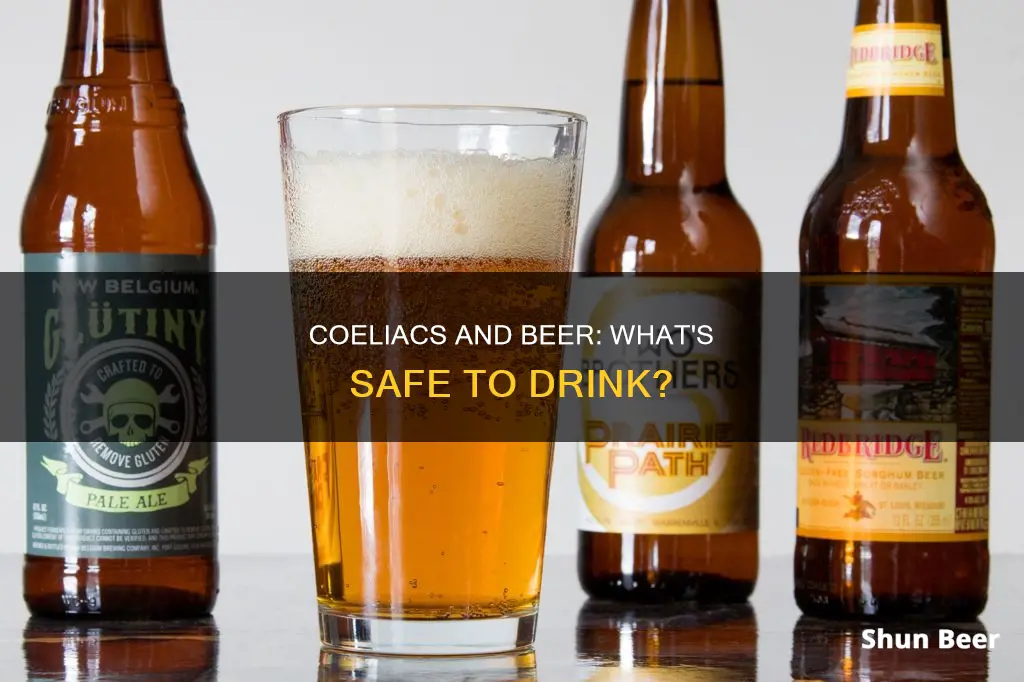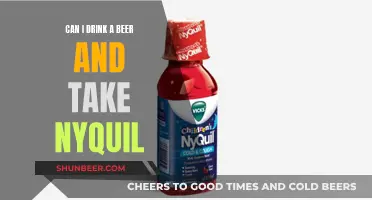
Coeliac disease is an autoimmune disorder that affects an estimated 1% of people worldwide. Those with the condition must avoid gluten, a protein found in grains such as wheat, barley and rye. This means that coeliacs must forgo foods and drinks like bread, pasta, cakes and biscuits and beer. Beer is traditionally made with barley, hops, yeast and sometimes wheat, and while the gluten level may decrease during the brewing process, most beers have a gluten content above 20 parts per million (ppm). However, there are gluten-free beers available, which are made with grains that don't contain gluten, such as sorghum, buckwheat or rice.
What You'll Learn

What is gluten?
Gluten is a type of protein found in grains such as wheat, barley, and rye. It is found in foods made with these grains, like bread, pasta, cereals, cakes, and some sauces and ready meals. It is also found in drinks, including some alcoholic drinks. Gluten gives bread and baked goods their chewy texture.
Gluten is naturally occurring but can be extracted, concentrated, and added to food and other products to add protein, texture, and flavor. It also works as a binding agent to hold processed foods together and give them shape.
Gluten is linked to celiac disease, an autoimmune disorder in which the immune system sees gluten as a toxic invader and attacks it, causing intestinal damage. The only treatment for celiac disease is to maintain a completely gluten-free diet. About 1% of Americans have celiac disease, and at least one in 100 people in the UK are estimated to have the disease.
Some people may also have non-celiac gluten sensitivity, which is gastrointestinal irritation caused by gluten in people who don't have celiac disease. Symptoms of non-celiac gluten sensitivity can include bloating, diarrhea, headaches, or skin rashes.
People with celiac disease or non-celiac gluten sensitivity should avoid beer made from barley, wheat, or rye, as these grains contain gluten. However, there are some specially made gluten-free beers available, either made with grains that don't contain gluten, like rice, or with the gluten removed during the production process.
White Tongue and Beer: Is It Safe to Drink?
You may want to see also

What is coeliac disease?
Coeliac disease is a serious autoimmune disease that occurs in genetically predisposed people. When people with coeliac disease eat gluten, their bodies mount an immune response that attacks the small intestine. These attacks damage the villi, small finger-like projections that line the small intestine and promote nutrient absorption. When the villi are damaged, nutrients cannot be absorbed properly into the body.
Coeliac disease is hereditary, meaning that it runs in families. People with a first-degree relative with coeliac disease (parent, child, or sibling) have a 1 in 10 risk of developing the disease. It can develop at any age after people start consuming gluten. Coeliac disease affects at least 1 in 100 people in the UK, and worldwide, it is estimated to affect 1 in 100 people. However, only about 30% are properly diagnosed.
The only treatment for coeliac disease is a lifelong adherence to a strict gluten-free diet. Gluten is a type of protein found in wheat, rye, and barley. It is present in many processed foods like bread, pasta, noodles, and cereals, as well as in drinks, including some alcoholic beverages. For people with coeliac disease, it is essential to maintain a completely gluten-free diet to avoid symptoms such as stomach aches, diarrhoea, and fatigue, as well as long-term complications, including weakened bones and severe anaemia.
Beer and Suboxone: What's the Deal?
You may want to see also

What drinks are gluten-free?
If you have coeliac disease, it's essential to follow a gluten-free diet to avoid symptoms like stomach aches, diarrhoea, fatigue, and long-term complications like weakened bones and severe anaemia.
So, what drinks are gluten-free?
Cider, wine, sherry, spirits, port, and liqueurs
These drinks are gluten-free. According to Coeliac UK, all commercially produced wine, spirits, cider, and liqueurs are gluten-free because of the way they are made, even though some are made from gluten-containing grains.
Distilled spirits
Distilled spirits only contain gluten if gluten-containing ingredients are added after the distillation process. In this case, labelling legislation ensures the product label clearly states if wheat, barley, rye, or oats have been added.
Beer
Most beers contain gluten and are not suitable for a gluten-free diet. However, there are gluten-free options available. There are two types of gluten-free beer: naturally gluten-free beer, which is made with grains that don't contain gluten, like rice, and gluten-removed gluten-free beer, where the gluten is removed at the end of the production process. Legally, only products with less than 20 parts per million (PPM) of gluten can be labelled as 'gluten-free'.
Other drinks
Most beverages are gluten-free, including juices, sodas, sports drinks, and water. Pure fruit juice is gluten-free, but be careful of smoothies, which sometimes have other ingredients. Milk is gluten-free, and if you're lactose intolerant, you can try soya milk or rice milk. Plain tea and coffee are gluten-free, but be careful of flavourings and additions. Most fizzy drinks are gluten-free, but be alert for 'cloud', which can be wheat-based.
Is Old, Open Beer Safe for Drinking?
You may want to see also

What are the symptoms of drinking beer with coeliac disease?
For people with coeliac disease, drinking beer can cause an immune reaction, with symptoms such as indigestion, diarrhoea, and fatigue. In the long term, drinking beer containing gluten can lead to weakened bones and severe anaemia.
However, the symptoms experienced by coeliacs who drink beer vary from person to person. Some coeliacs may not notice any symptoms at all, while others can only tolerate one or two gluten-reduced beers. In rare cases, some coeliacs can even drink gluten-containing beer with no adverse effects.
The severity of symptoms depends on the individual's gluten sensitivity, and the amount of gluten in the beer. Celiac disease can be triggered by as little as 10 milligrams of gluten per day. Gluten-removed beers may still contain gluten fragments, and are not recommended for people with coeliac disease.
To avoid symptoms, coeliacs should opt for gluten-free beers, which are made with grains that do not naturally contain gluten, such as sorghum, buckwheat, or rice.
The Magic of Auto-Fill Beer Cups: How Do They Work?
You may want to see also

What are the alternatives to beer?
For coeliacs, the only treatment is to remove gluten from your diet. Beer is traditionally made with barley, hops, yeast, and sometimes wheat, which contain gluten. However, there are now many alternatives to regular beer.
Gluten-free beers are made with grains that do not contain gluten, such as sorghum, quinoa, and buckwheat. These beers often cost more than regular beers, and they may taste slightly different, with some being sweeter or less carbonated.
There are also "gluten-removed" beers, which are made with gluten-containing grains but undergo a process to remove the gluten during production. However, some fragments of gluten may remain, so experts recommend that people with coeliac disease avoid these.
Other alternatives to beer include wine, cider, spirits, port, and liqueurs, which are naturally gluten-free. Non-alcoholic options are also available, such as non-alcoholic beer, spirits, wine, and mocktails. These can be a good option for those looking to reduce their alcohol intake or avoid the negative health impacts of alcohol.
Some other suggested alternatives to beer include kombucha, hop water, and non-alcoholic or low-alcohol IPAs.
The Magic Behind Beer Glycol Systems: Keeping Beer Cold
You may want to see also
Frequently asked questions
Regular beer is not recommended for coeliacs as it contains gluten. However, there are gluten-free beers available, which are made with grains that don't contain gluten, such as rice, sorghum, quinoa and buckwheat.
Gluten is a type of protein found in grains such as wheat, barley and rye. It is also found in many processed foods like bread, pasta, noodles and cereals.
If a coeliac consumes gluten, they could experience an immune reaction, with symptoms such as indigestion, diarrhoea, fatigue, weakened bones and severe anaemia.
Cider, wine, sherry, spirits, port and liqueurs are gluten-free.
Coeliacs should avoid beer, lager, stout and ale unless it is labelled "gluten-free". They should also be cautious of drinks labelled "gluten-removed", as some people with coeliac disease may still have an immune reaction to these products.







